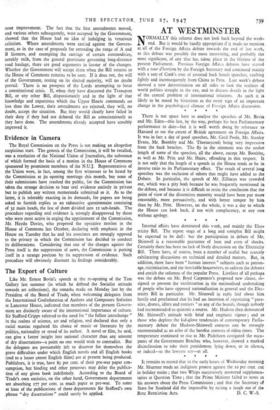The Export of Culture
Like Mr. Ernest Bevin's speech at the re-opening of the Tate Gallery last summer (in which he defined the Socialist attitude towards art collections), the remarks made on Monday last by the President of the Board of Trade, when welcoming delegates from the International Confederation of Authors and Composers Societies at Lancaster House, indicated that members of the present Govern- ment are distinctly aware of the international importance of culture. Sir Stafford-Griggs referred to the need for "the fullest interchange" in the realms of science, art and religion, and declared that only a racial maniac regulated his choice of music or literature by the politics, nationality or creed of its author. A novel or film, he said, - can give a better insight into national character than any amount of dry dissertations—a point no one would wish to contradict. But the delegates are presumably left to discover for themselves the grave difficulties under which English novels and all English books (and to a lesser extent English films) are at present being produced. Publishers, it is true, have 85 per cent. of their pre-war paper con- sumption, but binding and other processes may delay the publica- tion of any given book indefinitely. According to the Board of Trade's own statistics, on the other hand, Government departments are absorbing 177 per cent. as much paper as pre-war. To some at least of the publications of these departments Sir Stafford's own ,phrase "dry dissertations" could surely be applied.


































 Previous page
Previous page